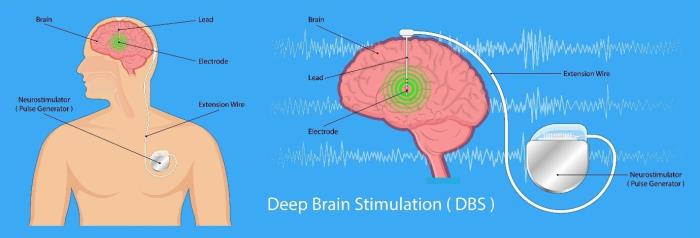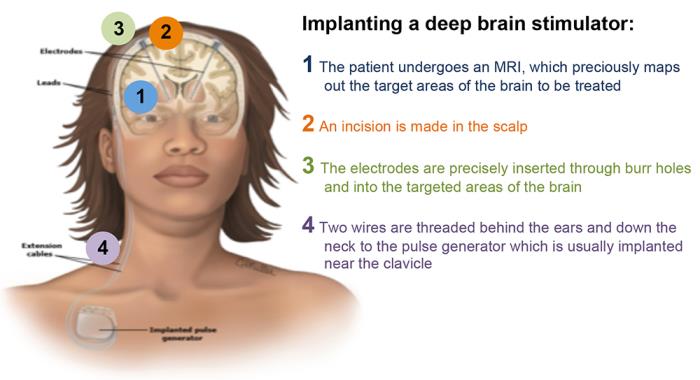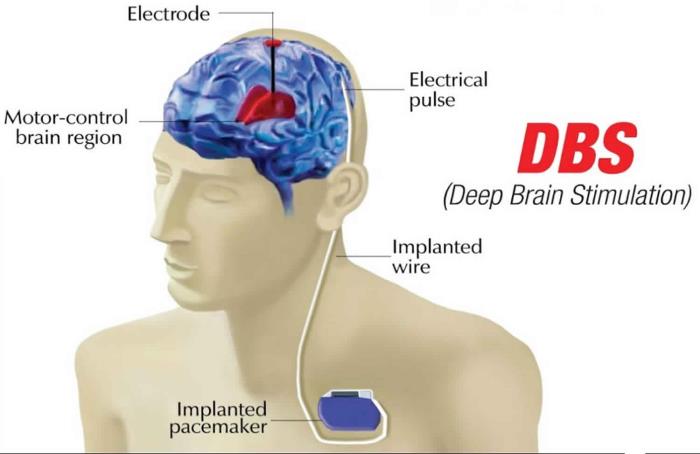Understanding Deep Brain Stimulation (DBS) Surgery
What is Deep Brain Stimulation (DBS) Surgery and How Does it Work?
Deep Brain Stimulation (DBS) surgery is a neurosurgical procedure that involves implanting a device called a neurostimulator into specific areas of the brain. This device sends electrical impulses to targeted brain regions to alleviate symptoms associated with neurological disorders like Parkinson's disease, essential tremor, and dystonia.
Medical disclaimer: This content is for general awareness and does not replace a doctor’s consultation. For diagnosis or treatment decisions, consult a qualified specialist.

DBS works by delivering controlled electrical impulses to brain regions responsible for motor control and coordination. These impulses help modulate abnormal brain activity, reducing symptoms such as tremors, rigidity, and involuntary movements. The stimulation can be adjusted according to the patient's needs, offering a personalized approach to managing neurological symptoms.
When is Deep Brain Stimulation (DBS) Surgery Necessary?
Deep Brain Stimulation (DBS) surgery is necessary when patients with neurological disorders, such as Parkinson's disease or essential tremor, experience severe symptoms that are resistant to medication. It is typically considered when symptoms significantly impair quality of life and other treatment options have proven inadequate.
Different Types of Deep Brain Stimulation (DBS) Surgeries
Different types of Deep Brain Stimulation (DBS) surgeries target various brain regions depending on the condition being treated. Common approaches include stimulation of the subthalamic nucleus for Parkinson's disease and the ventral intermediate nucleus for essential tremor, each tailored to address specific symptoms and improve patient outcomes.
The Deep Brain Stimulation (DBS) Surgery Procedure
Pre-Surgery Evaluation Process
The pre-surgery evaluation process for Deep Brain Stimulation (DBS) involves a comprehensive assessment to determine if the procedure is appropriate. This includes neurological evaluations, imaging studies like MRI or CT scans, and consultations with a multidisciplinary team to review medical history, current symptoms, and overall health to ensure optimal surgical outcomes.
Choosing the Right Type of DBS Surgery
Choosing the right type of Deep Brain Stimulation (DBS) surgery depends on the patient's specific condition and symptoms. This decision is guided by factors such as the targeted brain region, the nature of the neurological disorder, and the patient's response to previous treatments. A thorough evaluation by a specialized neurosurgeon helps tailor the DBS approach to achieve the best therapeutic results.
Detailed Surgical Procedure for DBS Surgery
The detailed surgical procedure for Deep Brain Stimulation (DBS) involves inserting electrodes into targeted brain regions through a small incision in the skull. These electrodes are connected to a pulse generator implanted in the chest, which delivers electrical impulses to modulate brain activity. The procedure is typically performed under local anesthesia with the patient awake for real-time adjustments to optimize stimulation settings.

Post-Surgery Care and Recovery
Post-surgery care for Deep Brain Stimulation (DBS) includes monitoring for potential complications and gradually adjusting the stimulation settings to optimize therapeutic effects. Recovery typically involves a short hospital stay, followed by a period of rehabilitation and follow-up visits to ensure proper device function and symptom management.
Top Hospitals for Deep Brain Stimulation (DBS) Surgery in India
Top hospitals for Deep Brain Stimulation (DBS) surgery in India include the All India Institute of Medical Sciences (AIIMS) in New Delhi, Fortis Healthcare in Mumbai, and Apollo Hospitals in Chennai. These institutions are renowned for their advanced technology, expert neurosurgeons, and comprehensive care in neurological treatments.
Success Rates and Survival Statistics for DBS Surgery in India
Success rates for Deep Brain Stimulation (DBS) surgery in India are high, with significant improvement in symptoms for 60-80% of patients with Parkinson's disease and essential tremor. Survival statistics also indicate favorable outcomes, with most patients experiencing enhanced quality of life and long-term benefits. These success rates reflect India's expertise and advanced techniques in neurological care.
Legal and Ethical Considerations for DBS Surgery in India
Legal and ethical considerations for Deep Brain Stimulation (DBS) surgery in India include ensuring informed consent, safeguarding patient confidentiality, and adhering to established medical standards. Ethical practices also involve assessing the patient’s suitability for surgery and providing transparent information about potential risks and benefits, ensuring patient autonomy and informed decision-making throughout the process.
Cost of DBS Surgery in India
The cost of Deep Brain Stimulation (DBS) surgery in India typically ranges between ₹15 lakh to ₹30 lakh, depending on the hospital, the complexity of the case, and the technology used. This cost generally includes the surgical procedure, hospital stay, and post-operative care, making it a cost-effective option compared to other countries.
Explore a detailed breakdown of deep brain stimulation (dbs) surgery cost in India by visiting our in-depth guide deep brain stimulation (dbs) surgery cost in India.
Deep Brain Stimulation (DBS) Surgery in India
India is a leading destination for Deep Brain Stimulation (DBS) surgery, with renowned specialists like Dr. Paresh Doshi, Dr. Sharan Srinivasan, and Dr. Ashish Srivastava at the forefront. These experts practice at prestigious centers like Jaslok Hospital, Manipal Hospital, and Medanta Hospital, offering world-class care for movement disorders such as Parkinson’s disease, dystonia, and essential tremor. With advanced technology and personalized treatment plans, India provides high-quality DBS surgery at competitive costs.
Preparing for Deep Brain Stimulation (DBS) Surgery
Lifestyle Changes Before DBS Surgery
Before Deep Brain Stimulation (DBS) surgery, patients are advised to make lifestyle changes such as managing their neurological symptoms with medication adjustments, following a balanced diet, and engaging in physical therapy to optimize their overall health. It's also important to avoid activities that may increase the risk of complications and to follow pre-surgery instructions provided by the healthcare team.
Medications and Treatments Required for DBS Surgery Patients
Patients undergoing Deep Brain Stimulation (DBS) surgery often require medications to manage their neurological symptoms and minimize complications. This typically includes medications to control pre-surgical symptoms, anticoagulants to reduce clotting risks, and pain relievers for post-operative discomfort. Additionally, ongoing treatments and adjustments to medication may be necessary to optimize the benefits of DBS and manage any side effects.
Importance of Support Systems and Counseling for DBS Surgery Patients
Support systems and counseling are crucial for Deep Brain Stimulation (DBS) surgery patients as they provide emotional support, help manage expectations, and aid in navigating the recovery process. Having a strong support network and access to counseling services can enhance adherence to post-surgery care, improve overall outcomes, and ensure a smoother adjustment to the changes following the procedure.
Life After Deep Brain Stimulation (DBS) Surgery
Recovery Process After DBS Surgery
The recovery process after Deep Brain Stimulation (DBS) surgery involves a period of rest and gradual adjustment to the implanted device. Patients typically experience some initial discomfort and swelling, but most return to normal activities within a few weeks. Follow-up appointments are essential to adjust the stimulation settings and monitor progress, ensuring optimal results and addressing any post-surgery concerns.
Long-term Care and Monitoring After DBS Surgery
Long-term care and monitoring after Deep Brain Stimulation (DBS) surgery involve regular follow-up visits to adjust stimulation settings and assess the device's performance. Ongoing evaluations help manage symptoms, address any complications, and ensure optimal therapeutic benefits. Patients are also encouraged to maintain a healthy lifestyle and adhere to prescribed medication regimens to support long-term success.

Potential Risks and Complications of DBS Surgery
Potential risks and complications of Deep Brain Stimulation (DBS) surgery include infection at the implant site, bleeding, and adverse reactions to the device. Patients may also experience side effects such as mood changes, speech difficulties, or motor impairments. Comprehensive pre-surgery assessments and careful post-operative monitoring help mitigate these risks and ensure effective management of any complications.
Latest Advancements in Deep Brain Stimulation (DBS) Surgery
Minimally Invasive Techniques in DBS Surgery
Minimally invasive techniques in Deep Brain Stimulation (DBS) surgery involve using advanced imaging technologies and smaller incisions to reduce tissue damage and recovery time. These techniques, such as frameless stereotaxy and microelectrode recordings, enhance precision in electrode placement while minimizing post-surgical discomfort and accelerating the healing process.
Use of Advanced Imaging for Better Outcomes
The use of advanced imaging techniques, such as MRI and CT scans, in Deep Brain Stimulation (DBS) surgery significantly enhances outcomes by providing precise anatomical maps of the brain. This accuracy allows for optimal electrode placement, reduces surgical risks, and improves symptom management by targeting specific brain regions more effectively.
Development of Adaptive DBS Systems
The development of adaptive Deep Brain Stimulation (DBS) systems represents a significant advancement, as these systems adjust stimulation parameters in real-time based on neural activity feedback. This adaptability enhances treatment precision, improves symptom control, and personalizes therapy, leading to better overall outcomes and reduced side effects for patients.
Frequently Asked Questions (FAQs) about Deep Brain Stimulation (DBS) Surgery
What is the success rate of DBS surgeries in India?
Success rates for Deep Brain Stimulation (DBS) surgeries in India are generally high, with significant improvement in symptoms for 60-80% of patients. This reflects the expertise of Indian hospitals and advanced techniques used in neurological care.
How long is the hospital stay after DBS surgery?
Hospital stays after DBS surgery typically range from 2 to 5 days, depending on the complexity of the procedure and the patient's individual recovery progress.
What is the cost of DBS surgery in India?
The cost of Deep Brain Stimulation (DBS) surgery in India generally ranges from ₹10 lakh to ₹25 lakh, varying based on the hospital, procedure specifics, and technology used.
What are the eligibility criteria for DBS surgery?
Eligibility for DBS surgery includes having a specific neurological condition that has not responded well to medication, as well as meeting overall health requirements set by the medical team.
What is the recovery time after DBS surgery?
The typical recovery time after DBS surgery is about 4 to 6 weeks, during which patients gradually resume normal activities and undergo follow-up evaluations to adjust stimulation settings.
What are the risks and complications associated with DBS surgeries?
Potential risks and complications of DBS surgery include infection at the implant site, bleeding, and device-related issues. Careful pre-surgery planning and post-operative monitoring help manage these risks effectively.
How do I find a suitable hospital for DBS surgery in India?
Finding a suitable hospital for DBS surgery in India involves consulting with your doctor and researching top institutions known for their experienced neurosurgeons and advanced technology.
What kind of post-surgery care is required after DBS surgery?
Post-surgery care for DBS includes medication adjustments, regular follow-up appointments for device programming, and monitoring to ensure optimal therapeutic outcomes and manage any complications.
Are DBS surgeries covered by insurance in India?
Coverage for DBS surgeries varies by insurance provider, so it is important to check with your insurance company to determine if the procedure is included in your plan.
Where can I find support groups for DBS surgery patients in India?
Support groups for DBS surgery patients in India can be found through hospitals, specialized neurology clinics, and online communities dedicated to neurological health and patient support.
Discover the common symptoms associated with conditions requiring Deep Brain Stimulation (DBS). Learn about persistent tremors, muscle rigidity, uncontrolled movements, and other neurological symptoms that DBS can effectively manage. Recognizing Symptoms That May Indicate the Need for Deep Brain Stimulation
Learn when Deep Brain Stimulation (DBS) surgery becomes necessary. Explore the conditions and symptoms, such as advanced Parkinson’s disease, essential tremor, and dystonia, that require DBS when medications and other treatments are no longer effective. Understanding When Deep Brain Stimulation Surgery Is Necessary
Discover the success rates of Deep Brain Stimulation (DBS) surgery. Learn how DBS improves symptoms for conditions like Parkinson’s disease, essential tremor, and dystonia, and explore the factors contributing to its effectiveness. Understanding the Success Rates of Deep Brain Stimulation Surgery